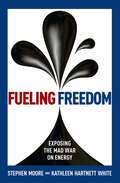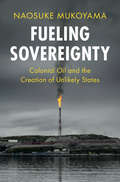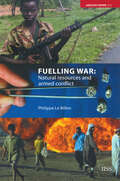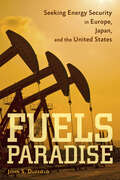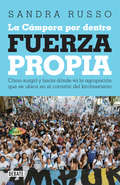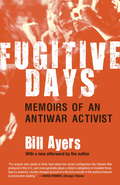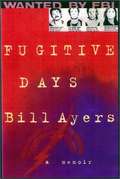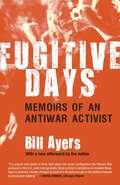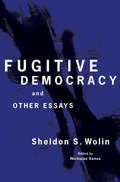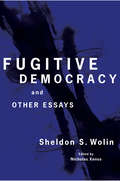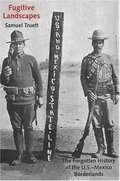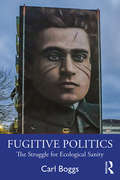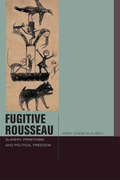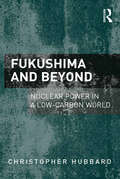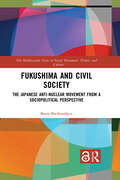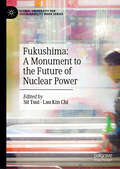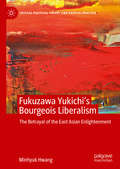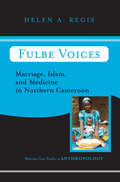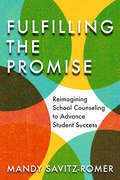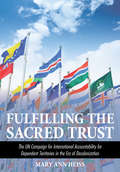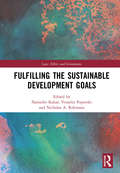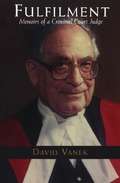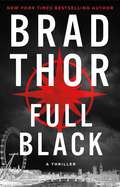- Table View
- List View
Fueling Freedom: Exposing the Mad War on Energy
by Stephen Moore Kathleen Hartnett WhiteFossil fuel energy is the lifeblood of the modern world. Before the Industrial Revolution, humanity depended on solar energy captured in living plants. But with the ability to harness the energy in coal and other fossil fuels, human quality of life and capacity for progress increased exponentially. With the recent advent of safe fracking techniques and incredible innovations in the energy industry, fossil fuels are as promising an energy resource as ever. Yet, highly politicized climate policies are pushing a grand-scale shift to new and less efficient energy sources. Is such a shift really necessary? If fossil fuel energy is supplanted by less efficient and less affordable alternatives for political reasons, will the modern world suffer?
Fueling Sovereignty: Colonial Oil and the Creation of Unlikely States (LSE International Studies)
by Naosuke MukoyamaEuropean colonialism was often driven by the pursuit of natural resources, and the resulting colonization and decolonization processes have had a profound impact on the formation of the majority of sovereign states that exist today. But how exactly have natural resources influenced the creation of formerly colonized states? And would the world map of sovereign states look significantly different if not for these resources? These questions are at the heart of Fueling Sovereignty, which focuses primarily on oil as the most significant natural resource of the modern era. Naosuke Mukoyama provides a compelling analysis of how colonial oil politics contributed to the creation of some of the world's most “unlikely” states. Drawing on extensive archival sources on Brunei, Qatar and Bahrain, he sheds light on how some small colonial entities achieved independence despite their inclusion in a merger project promoted by the metropole and regional powers.
Fuelling Insecurity: Energy Securitization in Azerbaijan
by Aurora GanzKnown as ‘the land of fire’, Azerbaijan’s politics are materially and ideologically shaped by energy. In the country, energy security emerges as a mix of coercion and control, requiring widespread military and law enforcement deployment. This book examines the extensive network of security professionals and the wide range of practices that have spread in Azerbaijan’s energy sector. It unpacks the interactions of state, supra‐state, and private security organizations and argues that energy security has enabled and normalized a coercive way of exercising power. This study shows that oppressive energy security practices lead to multiple forms of abuse and poor energy policies.
Fuelling War: Natural Resources and Armed Conflicts (Adelphi series #373)
by Philippe Le BillonA generous endowment of natural resources should favour rapid economic and social development. The experience of countries like Angola and Iraq, however, suggests that resource wealth often proves a curse rather than a blessing. Billions of dollars from resource exploitation benefit repressive regimes and rebel groups, at a massive cost for local populations. This Adelphi Paper analyses the economic and political vulnerability of resource-dependent countries; assesses how resources influence the likelihood and course of conflicts; and discusses current initiatives to improve resource governance in the interest of peace. It concludes that long-term stability in resource-exporting regions will depend on their developmental outcomes, and calls for a broad reform agenda prioritising the basic needs and security of local populations.
Fuels Paradise: Seeking Energy Security in Europe, Japan, and the United States
by John S. DuffieldIs the quest for true energy security a fool’s errand?In recent years, the efforts of nations to promote energy security have been hotly debated. Fuels Paradise examines how five major developed democracies—Britain, France, Germany, Japan, and the United States—have sought to enhance their energy security since the oil shocks of the 1970s and in response to the more diverse set of challenges of the early twenty-first century. Drawing on a vast range of primary and secondary sources, John S. Duffield explains the actions taken—and not taken—by these countries to address their energy security concerns.Throughout the book, Duffield argues that state strength and policy legacies are essential for understanding national responses to energy insecurity. In addition to identifying feasible energy policies and the constraints faced by policy makers, he evaluates the prospects for international cooperation to promote energy security and considers the implications of recent advances in the production and distribution of energy, particularly the fracking revolution.An ambitious cross-national and longitudinal study grounded in promising theories of national behavior, Fuels Paradise will contribute substantially to broader debates about the determinants of state action and public policy.
Fuerza propia: La Cámpora por dentro
by Sandra RussoLa historia de La Cámpora contada desde la perspectiva de sus militantesy conductores y explicada por primera y única vez por su fundador,Máximo Kirchner. Una fuerza propia del proyecto político delkirchnerismo que se plantea crecer y madurar más allá de las eleccionesde 2015. ¿Qué es La Cámpora? ¿Por qué son tan amados y odiados los integrantes deesa agrupación que diseña su accionar fuera de los medios y de losestudios de televisión? ¿Son hijos del poder, nenes de mamá, trepadores,improvisados, neomontoneros, o el germen de una nueva generación que seplantea otra forma de hacer política? Luego del éxito de La Presidenta.Historia de una vida, la biografía de Cristina Fernández de Kirchner,Sandra Russo logró que los miembros de la Mesa Nacional contaran susrespectivas biografías políticas. Un entramado de voces, algunas deellas sorprendentes, que leen la historia argentina desde unaperspectiva peronista y kirchnerista. Desde el asambleísmo y elpiqueterismo hasta la organización de una fuerza dedicada a defender,sostener y profundizar lo que definen como el proyecto nacional ypopular. Una fuerza propia que se plantea crecer y madurar más allá delas elecciones de 2015.En Fuerza propia. La Cámpora por dentro, Sandra Russo logra, además,incluir la voz de Máximo Kirchner, el conductor de la organización, elhijo de dos presidentes de la Nación, el dirigente que, según suscompañeros, tiene entre otras una aptitud de sus padres: saber mirarhacia adelante.
Fugitive Days
by Bill AyersBill Ayers was born into privilege and is today a highly respected educator. In the late 1960s he was a young pacifist who helped to found one of the most radical political organizations in U.S. history, the Weather Underground. In a new era of antiwar activism and suppression of protest, his story, Fugitive Days, is more poignant and relevant than ever.From the Trade Paperback edition.
Fugitive Days: A Memoir
by Bill AyersAyers helped found the Weather Underground in the late 1960s in response to the horror of the Vietnam War. He recounts a decade of living as a fugitive, stealing explosives, hiding from the law, and losing his beloved Diana Oughton in an explosion. The 2001 edition was published by Beacon Press. Annotation ©2004 Book News, Inc. , Portland, OR (booknews. com)
Fugitive Days: Memoirs of an Antiwar Activist
by Bill Ayers[Back cover] THE TRUE STORY OF THE 60S RADICAL AT THE CENTER OF THE RIGHT WING'S 2008 OBAMA SMEAR CAMPAIGN Bill Ayers was born into privilege and is today a highly respected educator. In the late 1960s he was a young pacifist who helped to found one of the most radical political organizations in U.S. history, the Weather Underground. In a new era of antiwar activism and suppression of protest, his story, Fugitive Days, is more poignant and relevant than ever.
Fugitive Democracy: And Other Essays
by Sheldon S. Wolin Nicholas XenosSheldon Wolin was one of the most influential and original political thinkers of the past fifty years. Fugitive Democracy brings together his most important writings, from classic essays such as "Political Theory as a Vocation," written amid the Cold War and the conflict in Vietnam, to his late radical essays on American democracy such as "Fugitive Democracy," in which he offers a controversial reinterpretation of democracy as an episodic phenomenon distinct from the routinized political management that passes for democracy today.The breathtaking range of Wolin's scholarship, political commitment, and critical acumen are on full display in this authoritative and accessible collection. He critically engages a diverse range of political theorists, including Thomas Hobbes, Karl Marx, Max Weber, Hannah Arendt, John Rawls, Michel Foucault, and Richard Rorty. These essays grapple with topics such as power, modernization, the sixties, revolutionary politics, and inequality, all the while showcasing Wolin's enduring commitment to writing civic-minded theoretical commentary on the most pressing political issues of the day. Here, Wolin laments the rise of conservatives who style themselves as revolutionary, criticizes Rawlsian liberals as abstract to the point of being apolitical, diagnoses postmodern theory as a form of acquiescence, and much more.Fugitive Democracy offers enduring insights into many of today's most pressing political predicaments, and introduces a whole new generation of readers to this provocative figure in contemporary political thought.
Fugitive Democracy: And Other Essays
by Sheldon S. Wolin Nicholas XenosSheldon Wolin was one of the most influential and original political thinkers of the past fifty years. In Fugitive Democracy, the breathtaking range of Wolin’s scholarship, political commitment, and critical acumen are on full display in this authoritative and accessible collection of essays. This book brings together his most important writings, from classic essays to his late radical essays on American democracy such as "Fugitive Democracy," in which he offers a controversial reinterpretation of democracy as an episodic phenomenon distinct from the routinized political management that passes for democracy today. Wolin critically engages a diverse range of political theorists, and grapples with topics such as power, modernization, the sixties, revolutionary politics, and inequality, all the while showcasing enduring commitment to writing civic-minded theoretical commentary on the most pressing political issues of the day. Fugitive Democracy offers enduring insights into many of today’s most pressing political predicaments, and introduces a whole new generation of readers to this provocative figure in contemporary political thought.
Fugitive Landscapes: The Forgotten History of the U.S.-Mexico Borderlands
by Samuel TruettThis book reveals the forgotten story of their ambitious dreams and their ultimate failure to control this fugitive terrain. Focusing on a mining region that spilled across the Arizona--Sonora border, this book shows how entrepreneurs, corporations, and statesmen tried to domesticate nature and society within a transnational context. Efforts to tame a "wild" frontier were stymied by labor struggles, social conflict, and revolution. Fugitive Landscapes explores the making and unmaking of the U. S. -Mexico border, telling how ordinary people resisted the domination of empires, nations, and corporations to shape transnational history on their own terms. By moving beyond traditional national narratives, it offers new lessons for our own border-crossing age.
Fugitive Politics: The Struggle for Ecological Sanity
by Carl BoggsFugitive Politics explores the intersection between politics and ecology, between the requirements for radical change and the unprecedented challenges posed by the global crisis, a dialectic has rarely been addressed in academia. Across eight chapters, Carl Boggs explores how systemic change may be achieved within the current system, while detailing attempts at achieving change within nation-states. Boggs states that any notion of revolution seems fanciful in the current climate, contending that controlling elites have concentrated their hold on corporate power along three self-serving fronts: technology (Big Tech) and the surveillance order, militarism and the warfare state, and intensification of globalized power. Combined with this Boggs cites the fundamental absence of revolutionary counter-forces, arguing that after decades of subservice relevant, allied to the rise of identity politics and social movements, the Marxist theoretical legacy is now exhausted and will not provide an exit from the crisis. Boggs concludes that the only possibility for fundamental change will come from an open style of politics, in the Jacobin tradition, operating within the overall structures of the current democratic state. Written for both an academic and a general readership, in the U.S. and beyond, Fugitive Politics will be of vital importance to those studying political theory, political philosophy, political history, Marxism and Marxist theory, authoritarian politics, ecology, environmental politics, and climate politics.
Fugitive Rousseau: Slavery, Primitivism, and Political Freedom (Just Ideas)
by Jimmy Casas KlausenCritics have claimed that Jean-Jacques Rousseau was a primitivist uncritically preoccupied with “noble savages” and that he remained oblivious to the African slave trade. Fugitive Rousseau presents the emancipatory possibilities of Rousseau’s thought and argues that a fresh, “fugitive” perspective on political freedom is bound up with Rousseau’s treatments of primitivism and slavery.Rather than trace Rousseau’s arguments primarily to the social contract tradition of Hobbes and Locke, Fugitive Rousseau places Rousseau squarely in two imperial contexts: European empire in his contemporary Atlantic world and Roman imperial philosophy. Anyone who aims to understand the implications of Rousseau’s famous sentence “Man is born free, and everywhere he is in chains” or wants to know how Rousseauian arguments can support a radical democratic politics of diversity, discontinuity, and exodus will find Fugitive Rousseau indispensable.
Fukushima and Beyond: Nuclear Power in a Low-Carbon World
by Christopher HubbardThe catalyst for this study was the Fukushima-Daiichi major nuclear accident of 11 March 2011. In this event, a severe earthquake and15 metre tsunami caused serious damage and equipment failures at Japan’s Fukushima 1 Nuclear Power Plant which were judged by the International Atomic Energy Agency to be equally as serious as the Soviet Chernobyl nuclear disaster of 1986. Against a background of nuclear hesitancy and reassessment, the prospect of including or excluding nuclear power in a low-carbon twenty-first century world is now increasingly critical. It is in this emerging scenario and context that this book presents a full suite of historical, contemporary and projected data. Its use of complementary and comparative country-based case studies provides ample opportunity for developing strongly illustrative analysis of policy effectiveness in diverse polities and markets. In this way, it combines clear, comprehensive and rigorously science-based evidence, analysis and interpretation of data, all leading to conclusions and policy recommendations. Furthermore, it builds an understanding of the complexities and many challenges posed by the nuclear power option.
Fukushima and Civil Society: The Japanese Anti-Nuclear Movement from a Socio-Political Perspective (The Mobilization Series on Social Movements, Protest, and Culture)
by Beata BochorodyczThis book analyzes the impact of the Fukushima disaster on civil society in Japan with particular attention to the anti-nuclear movement, focusing on its development, repertoire of action, mobilization strategies, modes of operation, and impact on the state’s energy policy. Combining social movement theory and civil society theory, the author draws on extensive fieldwork in Japan to explore the context of the sociopolitical situation in Japan up to the Fukushima accident and to offer a typological description and analysis of the anti-nuclear movement that emerged after the disaster. Through an analysis of the relationship between the power elite and the anti-nuclear movement organizations, this volume considers the influences exercised by the ruling elites on civil society and vice versa, thus assessing the effects of the anti-nuclear movement on the state policy and the society. A comprehensive account of the anti-nuclear movement in post-Fukushima Japan, embedded within a broader perspective of the movement’s historical development, contemporary political structures, and opportunities, Fukushima and Civil Society will appeal to scholars of sociology and politics with an interest in social movements. Chapter 4 of this book is freely available as a downloadable Open Access PDF at http://www.taylorfrancis.com under a Creative Commons [Attribution-Non Commercial-No Derivatives (CC-BY-NC-ND)] 4.0 license.
Fukushima: A Monument to the Future of Nuclear Power (Global University for Sustainability Book Series)
by Kin Chi Lau Tsui SitThe book is a collection of essays written by scholars/activists who are continuously concerned about the Fukushima catastrophe. The authors engagingly address the devastating environmental, economic, and social consequences of nuclear disasters, as well as recognize resistance of local communities through searching for alternative life and thought. The book offers a critique of nuclear energy and calls for collective action for social justice and ecological justice.
Fukuzawa Yukichi’s Bourgeois Liberalism: The Betrayal of the East Asian Enlightenment (Critical Political Theory and Radical Practice)
by Minhyuk HwangFukuzawa Yukichi’s Bourgeois Liberalism introduces readers to the East Asian Enlightenment led by Fukuzawa Yukichi, one of the most important figures in the intellectual history of modern Japan. Despite his impact on political theory and modern Japanese history, Fukuzawa remains under-researched in Western academia, and while a few English-language books have been written about Fukuzawa, none have dealt with his political theory. This book describes Fukuzawa as a character with universal relevance and a unique view of the Enlightenment tradition. Emphasizing the power of bourgeois liberalism and the debate regarding its potential for transforming the strict class-caste society of Tokugawa Japan, Hwang discusses Fukuzawa's belief in the significance of individual autonomy, progress, and liberal rule of law in developing his project of the East Asian enlightenment, as well as his supposed “betrayal” of his early commitments due to his existential desire for Western recognition of Japan’s greatness. The book ends with an analysis of the complex relation between liberalism and progress in the East Asian context.
Fulbe Voices: Marriage, Islam, and Medicine In Northern Cameroon (Case Studies in Anthropology)
by Helen A. RegisThrough the fall of Anastasio Somoza, the rise of the Sandinistas, and the contra war, the United States and Nicaragua seemed destined to repeat the mistakes made by the U.S. and Cuba forty years before. The 1990 election in Nicaragua broke the pattern. Robert Pastor was a major US policymaker in the critical period leading up to and following the Sandinista Revolution of 1979. A decade later after writing the first edition of this book, he organized the International Mission led by Jimmy Carter that mediated the first free election in Nicaragua's history. From his unique vantage point, and utilizing a wealth of original material from classified government documents and from personal interviews with U.S. and Nicaraguan leaders, Pastor shows how Nicaragua and the United States were prisoners of a tragic history and how they finally escaped. This revised and updated edition covers the events of the democratic transition, and it extracts the lessons to be learned from the past.
Fulfilling the Promise: Reimagining School Counseling to Advance Student Success
by Mandy Savitz-RomerSavitz-Romer offers a strategic approach to school counseling that enables educational leaders to draw on existing staff to create supportive contexts and programs for students. In this model of the &“academic home,&” counselors serve as the first point of contact for student support, connecting and coordinating services much like primary care physicians coordinate patient care in medical settings. They serve as the hub of a network of supports to prevent students from falling between the cracks. By highlighting promising practices in schools, districts, and states, and the efforts of individual school counselors and leaders, Fulfilling the Promise presents a conceptualization of school counseling that is relevant for all educators, as well as policy makers and funders. In order to create the conditions for school counselors to be most effective, however, systemic barriers must be addressed. This book brings together research, practical experience, and policy recommendations to envision a focused and practical role for school counselors in the twenty-first century.
Fulfilling the Sacred Trust: The UN Campaign for International Accountability for Dependent Territories in the Era of Decolonization
by Mary Ann HeissFulfilling the Sacred Trust explores the implementation of international accountability for dependent territories under the United Nations during the early Cold War era. Although the Western nations that drafted the UN Charter saw the organization as a means of maintaining the international status quo they controlled, newly independent nations saw the UN as an instrument of decolonization and an agent of change disrupting global political norms. Mary Ann Heiss documents the unprecedented process through which these new nations came to wrest control of the United Nations from the World War II victors that founded it, allowing the UN to become a vehicle for global reform.Heiss examines the consequences of these early changes on the global political landscape in the midst of heightened international tensions playing out in Europe, the developing world, and the UN General Assembly. She puts this anti-colonial advocacy for accountability into perspective by making connections between the campaign for international accountability in the United Nations and other postwar international reform efforts such as the anti-apartheid movement, Pan-Africanism, the Non-Aligned Movement, and the drive for global human rights.Chronicling the combative history of this campaign, Fulfilling the Sacred Trust details the global impact of the larger UN reformist effort. Heiss demonstrates the unintended impact of decolonization on the United Nations and its agenda, as well as the shift in global influence from the developed to the developing world.
Fulfilling the Sustainable Development Goals: On a Quest for a Sustainable World (Law, Ethics and Governance)
by Narinder Kakar, Vesselin Popovski and Nicolas A. RobinsonThis book contains assessment of the progress, or the lack of it, in implementing the UN Sustainable Development Goals (SDGs). Through review of the assessments and of case studies, readers can draw lessons from the actions that could work to positively address the goals. The 2030 Agenda for Sustainable Development is designed to catalyze action in critical areas of importance to humanity and the planet. The effort to implement the SDGs, however, demands a sense of urgency in the face of environmental degradation, climate change, emerging conflicts, and growing inequality, among a number of other socio-economic problems. Five years after the launch of the 2030 Agenda, this book takes stock of how far the world has come and how we can position ourselves to achieve the global targets. The book is one of the first to assess how the implementation is impeded by the onset of COVID-19. It contains a special chapter on COVID-19 and the SDGs, while many thematic chapters on different SDGs also assess how COVID-19 adversely affects implementation, and what measures could be taken to minimize the adverse effects. This publication thus provides a fresh look at implementation of the SDGs highlighting impactful and creative actions that go beyond the business-as-usual development efforts. The volume reinforces this analysis with expert recommendations on how to support implementation efforts and achieve the SDGs through international and national strategies and the involvement of both the public and private sectors. The result is an indispensable textual tool for policy makers, academia, intergovernmental organizations (IGOs) and non-governmental organizations (NGOs), as well as the public, as we march toward the 2030 deadline.
Fulfilment: Memoirs of a Criminal Court Judge
by David VanekSoldier, university professor, lawyer, political candidate, and judge; David Vanek’s compelling life story has seen him in many roles, all of which are played out in these memoirs. The child of Jewish-Russian immigrants, Vanek encountered anti-semitism while growing up, but was able to overcome prejudice and rise to prominence. He was educated at the University of Toronto and Osgoode Hall Law School (where he was in a Jewish fraternity with Johnny Wayne and Frank Shuster) before serving in the Second World War. When the war was over, he returned to the University of Toronto to teach law, and opened his own practice. In 1963 he ran for Parliament as a member of the Progressive Conservative party. In 1968 Vanek became a provincial court judge, and would preside over cases dealing with robbery, drugs, assault, gambling, pollution, and embezzlement, as well as the rights of citizens vs. the rights of police. His most high-profile case was that of Susan Nelles, a nurse at Toronto’s Hospital for Sick Children who was charged with the murders of four babies at the hospital. Vanek went on to become the president of the Provincial Court Judges Association, and was active in campaigning for changes in how the courts treat young offenders.
Full Black: A Thriller (The Scot Harvath Series #10)
by Brad Thor#1 New York Times and #1 Wall Street Journal bestselling author Brad Thor brings his darkest and most intriguing thriller yet—a terrifying story of espionage and betrayal—brilliantly paced with superb nonstop action.Born in the shadows and kept from heads of state, there are some missions so deadly, so sensitive, that they simply don&’t exist. When one such mission goes horribly wrong, a wave of dramatic terrorist attacks is set in motion. Their goal: the complete and total collapse of the United States. With the CIA&’s intelligence abilities hobbled, former Navy SEAL Team Six member turned covert counterterrorism operative Scot Harvath launches an audacious plan to infiltrate the terrorists&’ network and prevent one of the biggest threats the United States has ever faced. Simultaneously, a foreign wet work team has been sent to California. Their target: one of Hollywood&’s most famous filmmakers. While working on a secret documentary project, movie producer Larry Salomon has unknowingly exposed one of the world&’s wealthiest and most politically connected powerbrokers—a man with a radical anti-American agenda poised to plunge the nation into deadly, irreversible chaos. As the plots rocket to their pulse-pounding conclusion and the identities of the perpetrators are laid stunningly bare, Harvath will be left with only one means to save America. Unable to trust anyone, he will be forced to go Full Black. Intense and frighteningly realistic, Full Black is hands down Brad Thor&’s most riveting thriller to date.
Full Disclosure
by Stormy Daniels Michael AvenattiInstant New York Times bestseller"Standing up to bullies is my kind of thing."How did Stormy Daniels become the woman willing to take on a president? In this book, Stormy Daniels tells her whole story for the first time: what it's like to be a leading actress and director in the adult film business, the full truth about her journey from a rough childhood in Louisiana onto the national stage, and everything about her interaction with Donald Trump that led to the nondisclosure agreement and the behind-the-scenes attempts to intimidate her.Stormy is funny, sharp, warm, and impassioned by turns. Her story is a thoroughly American one, of a girl who loved reading and horses and who understood from a very young age what she wanted?and who also knew she'd have to get every step of the way there on her own.People can't stop talking about Stormy Daniels. And they won't be able to stop talking about her fresh, surprising, completely candid, nothing-held-back book.
